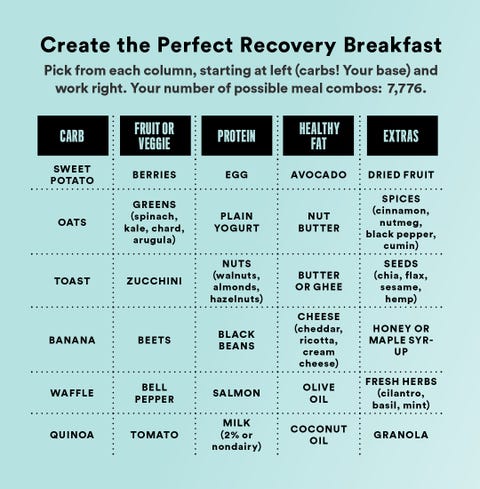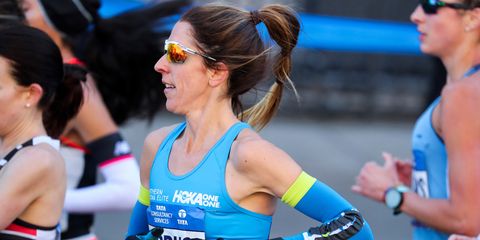I’m glad you’re recording this, because I want to go on record: Morning people do not exist,” booms Brogan Graham, the gregarious cofounder of the free morning exercise movement the November Project. With upward of 20,000 members in dozens of worldwide “tribes,” as they’re called, the November Project has nearly become synonymous with mornings. Convincing people to wake up before the sun, and often in subfreezing temperatures, was no picnic, contends Graham.
“I’M GLAD YOU’RE RECORDING THIS, BECAUSE I WANT TO GO ON RECORD: MORNING PEOPLE DO NOT EXIST.”
Waking up early objectively sucks. It’s hard for everyone. But there is a reason why, despite its daybreak call time, the November Project has grown so dramatically: Working out in the morning is special—dare we say magical. “A lot of it is an experience,” says Graham. “The a.m. is such an alien time. By the time the sun comes up, you feel like you stole something from the city.”
Listen, we know you’ve heard that morning running is good for you—early bird gets the worm and all that. There is so much more to it, though. Researchers are discovering that, in ways big and small, exercising first thing is significantly better for the mind and body.
For example, running in the morning, as opposed to any other time of day, is more effective at lowering your blood pressure, and inducing longer, more beneficial sleep cycles the next night, according to a study published in Vascular Health and Risk Management. Run first thing on an empty stomach, and you could burn 20 percent more fat than exercising later in the day without eating, and reduce p.m. food cravings while you’re at it. Researchers have also found that morning runners finish their day with more total physical activity, regardless of their weight. As Newton put it, a body in motion remains in motion.
If nothing else, being a morning runner puts you on a schedule. “Consistency is the most important thing in running, and a.m. running is consistent running,” says trail-running coach David Roche, who encourages many of his athletes to transition to a.m. training. “Mornings are much more predictable; there are fewer obstacles.” What’s more, a 2012 review from Tunisian researchers found that exercise performed at the same time of day produced greater physiological adaptations—in other words, sticking to a morning schedule can make you fitter.
We get that all of these selling points won’t make the actual crack-of-dawn wake-up easier. Getting up early requires Herculean willpower, and that ungodly alarm never quite loses its sting. The upshot? There has never been a better time to develop (or improve) your morning running routine than right now. We’re at the start of a brand new decade, and with that can come more commitment to changing up your overall routine.
To boost your drive even more, we spoke with exercise scientists, coaches, pros, and average running joes to put together this definitive guide to owning your morning. Use the advice, and you’ll build an efficient, productive, fulfilling a.m. routine that will help you generate genuine excitement for the best part of waking up early—getting to run. And perhaps that’s all that’s kept you from making the morning habit stick.

Roll Out of Bed
“Before I started running, if I got out of bed before noon, it was early,” says ultrarunner Dean Karnazes, who famously “picked up” the sport on his 30th birthday. He now wakes up around 3:30 a.m. and likes to run a marathon before breakfast. While the following hacks won’t transform you into Karnazes, they can help you throw back the covers and hit the streets—and maybe even be psyched to do so.
Let that light shine in. Three main factors affect your chronotype, or your natural sleep-wake schedule, says Kristin Eckel-Mahan, Ph.D., a researcher who specialises in circadian rhythms: age, genetics, and light. You can change only one of those. Among the best ways to naturally wake up and gradually shift your chronotype earlier is to expose yourself to natural light. The body evolved to sleep and wake with the sun, and by letting the sunrise pour into your room—or by using a light-simulating alarm clock—you’ll be able to rise with (more) ease.
Don’t hit snooze. That extra rest you think you’re getting actually keeps you in a not-quite-awake, not-quite-asleep state—the worst of both worlds. Instead, put your alarm clock across the room, and force yourself to get up on the first bell. Four-time USATF trail-running national champion Megan Roche, who would wake up at 3 a.m. to run while juggling medical school and training, says her rule is to never, ever snooze. “No matter how tired she was,” says husband David Roche, “she would never hit it. If you know that option is open, you’re going to take it.”
Ignore your electronic BF. “The phone is a major problem for morning runs,” says Mario Fraioli, running coach and author of The Morning Shakeout. “I have athletes who say they want to run at 7, but actually run at 7:20 because they’re on their phones for 20 minutes.” Issue yourself a challenge: The second you wake up, stash your phone under your pillow. Leave it there while you’re getting dressed, making coffee, warming up. Take it on your run if you must, but don’t go scrolling until you’re back. Checking email—or at least Insta—can be your reward when you’re done.
Grab liquid courage. Hydrating before you run is a given, but instead of standing at the sink and chugging a glass of plain H2O, get creative. Prep some ice water with fresh-squeezed lemon, or a hot tea with a hit of ginger or cayenne. Whatever sounds refreshing or energizing to you.
Loosen Up
“My warmup is non-negotiable,” says Michael Olzinski, a triathlete coach at Purple Patch Fitness. “Just five minutes breaks the little fascial connections that get made overnight.” Coach David Roche agrees: “Warming up is good for all running, but especially morning running. Even if you have to cut minutes off your run, it’s worth it to have a routine that doesn’t leave you super stale when you start. You reduce injury risk, and psychologically, you finish and you’re like, ‘I’m ready to run,’ ” he says. “It’s almost a Pavlovian response.”
Here, five easy moves that Olzinski and Roche recommend:
- Walk around: It may sound simple, but it’s important. Shake the cobwebs off and really let your nerves and muscles switch on, says Olzinski.
- Prime the calves: While Olzinski sips coffee, he’ll bounce on his toes and do calf raises to wake up stiff ankles and the Achilles.
- Lunge: Roche says a lunge matrix is one of the best things you can do before heading out the door. It activates your glutes, quads, and hamstrings, provides a dynamic stretch, and if you do it consistently, it will build strength. Stand upright, and lunge forward 10 times, alternating legs. Repeat, this time performing a trunk twist. Go again, and lean side-to-side, arms in goal-post position. Finally, do 10 backward lunges, alternating legs. (Note: Return to a standing position after each rep—this is not a walking lunge.)
- Add a balance challenge: Don’t bend over or sit down to put on your shoes. Instead, balance on one leg while lacing up the opposite foot. This will activate your body’s small stabilizing muscles.
- Swing those legs: As soon as you step out the door, find a tree or railing to lean against and do 10 swings with each leg front-to-back, then 10 side-to-side. This loosens the hip joint and creaky tendons.
Let Music Set the Mood
“On the days that I’m dragging, music gets me out the door,” says pro ultrarunner and Western States 160-kilometre winner Timothy Olson. Research has shown that music can increase work output, improve exercise performance, delay fatigue, and, of course, boost your mood. And if waking up to run one morning feels particularly unbearable, a playlist could be the perfect antidote—one small thing to look forward to that helps coax you out of a warm bed. “Podcasts and music can be a helpful tool to not feel lonely and purposeless super early in the morning,” says Roche.
We polled all of our sources—athletes, coaches, and scientists alike—on their favorite morning run songs for warming up, powering through the workout, and cooling down. The result is the energetic, rocking playlist at right. Download it for tomorrow’s run, and we promise it will be worth waking up for.

Do the First Meal Right
Post–morning run, treat yourself to a generous, healthy, delicious breakfast. Why: Studies show that those who eat a big morning meal generally eat less throughout the day than those who forgo breakfast. Refueling after a run is also vital; skip it, and your body is deprived of essential nutrients to build fitness, and your energy tanks. Plus, a mouthwatering breakfast creates the reward response in your brain that leads to more morning running.
The ideal meal, says Stephanie Howe Violett, a champion ultrarunner who holds a Ph.D. in nutrition, has carbs to replenish fuel, protein to build muscle, fat to help absorption, and flavor because…duh. Use her mix-and-match chart at right to nail it all.

To Win the a.m., Ace the p.m.
How you feel in the morning is a direct result of all the decisions you made the previous night. Adopt these small habits, and becoming an early runner will be worlds easier.
Pull back your bedtime. Perhaps the single most important part of getting up early is going to bed early. “A lot of folks trying to develop a morning running routine neglect that part,” says coach Mario Fraioli. “As you start to get up earlier, you will get tired earlier, and listening to that cue is essential.” In essence, becoming a morning runner is less about forcing yourself awake and more about listening to when your body needs to hit the hay.
Try melatonin—but early evening. Melatonin is a natural hormone produced by the body that induces drowsiness and regulates the wake-sleep cycle. Recently, over-the-counter supplements have gained popularity among those who have trouble falling asleep but don’t want to commit to a prescription sleeping aid. Kristin Eckel-Mahan recommends that instead of popping melatonin right before bed, like you would a sleeping pill, take it earlier in the evening, which will work to more effectively adjust your body clock. “To shift your chronotype, this is a much better mechanism,” she says.
Ban blue light. You’ve heard it a thousand times: no phones for at least 30 minutes before bed. That’s not just because checking work email can stress you out, but also because the blue light is signaling to your brain, and thus the rest of your body, that it’s time to be active. “The central pacemaker in the brain is primarily determined by the light-dark cycle and is extremely light-responsive,” says Eckel-Mahan. “Abnormal light exposure will misalign your clock.”
Eat dinner early (and don’t eat again). Each cell, tissue, and organ in the body has its own internal clock that produces its own biological rhythm, and in a perfect world, all of these clocks will be in sync. Just like bright lights signal to your brain that it’s time to wake up, food tells the metabolic organs that it’s time for activity. That midnight snack you think is harmless (you’re a runner, after all), is actually telling your liver and kidneys, for example, that it’s time to go. “Generally you want your food intake to match your activity phase,” says Eckel-Mahan. “That keeps your clocks aligned.” What’s more, she adds, eating during your body’s rest phase, and thus misaligning your clocks, is thought to promote obesity, diabetes, and other metabolic disorders.
Don’t bring work home with you. It’s the advice of innumerable productivity manuals and self-help guides: Get your hardest work done first thing in the morning, when your mind is typically sharpest and willpower strongest. And your morning run could also benefit from it. If you put off your hardest work till the evening, bringing that baggage home with you, it’s a recipe for stressed sleep. Plus, front-loading your work and running in the morning (which is shown to improve concentration and memory) can create a positive feedback loop: run early, feel great, nail your big project, tend to smaller things in the afternoon, come home clear-headed, fall asleep early, repeat.
Morning Routines of the Pros



“As soon as I get back from my run, around 7 or 7:30, I go straight to the kitchen to make my pancakes.” Taylor Ward
How to Make Mornings Stick
Reward yourself: Treating yourself to something you enjoy after the run—like the day’s first scroll through Instagram, your favorite podcast, or a delicious breakfast—will actually develop neurological pathways that associate the early morning run with said reward. Soon, those same Pavlovian pathways activate whether you give yourself the reward or not. It’s like your brain learning to subconsciously motivate itself.
Let yourself go slow: For those used to running in the afternoon or evening, the body’s early sluggishness might be disheartening at first. “My one piece of advice,” says coach John Honerkamp, “is focus on effort, not pace. The body is slow-moving in the morning, and it needs to get used to it.” The surest way to abandon your new morning routine is trying to PR every day. “It doesn’t mean you’re not getting fitter. Getting out the door is the important thing.”
Give it three weeks: Before the November Project became a national fitness sensation, founder Brogan Graham was tasked with convincing friends, acquaintances, and strangers to wake up before the sun. One time is easy—it’s novel and thrilling. But how do you make it a habit? “Make a goal of more than one morning,” Graham says. “Your first time is going to suck. The second one you’ll have a better understanding. And the third, you’ll be looking forward to getting up.”
Think about future you: Recall when you first started running. Maybe your ankles hurt, your lungs burned. Yet you persisted, and looking back now, you’re better for it. Take this same outlook for developing a morning routine right now: You’ll be so glad you did. “I always regret not going on my morning runs,” says Honerkamp. “But I never regret doing it.”

